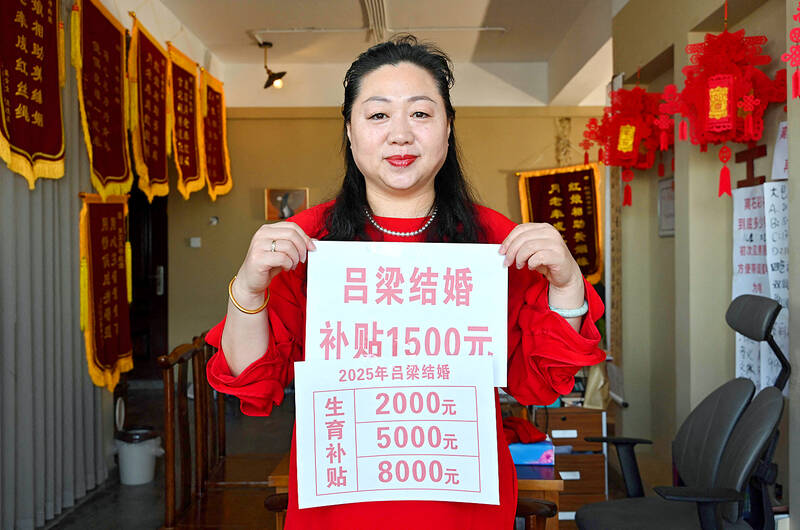Marriage for profit
Moments after registering their marriage, Zhang Gang and Weng Linbin posed in front of a red backdrop adorned with a Chinese government emblem, fanning out the wad of cash they had received as an incentive to wed. Zhang’s home city of Luliang in northern Shanxi province is one of many places in China where local authorities are offering a slew of inducements to coax couples into tying the knot. The 1,500-yuan reward the couple received is part of official efforts to boost the country’s population, which fell for the third straight year in 2024. The sum is half a month’s average wage for Luliang’s urban population — and more than the monthly average wage for its rural citizens, according to official data. “I think this policy is quite effective in improving the current marital and romantic situation,” the groom told AFP. More generally, though, authorities are fighting a tide of reluctance from young people. Last year marriages dropped by a fifth compared to 2023, data released Monday showed.
When it comes to having children, experts say that higher costs — especially for education and childcare — and the challenging employment market for recent graduates are among factors discouraging would-be parents. The former mining city is also offering subsidies and medical insurance contributions for registering newborns. Married couples in Luliang are given 2,000 yuan for their first registered child, 5,000 for their second and 8,000 for their third. At a Luliang marriage registry office on Wednesday, a festival day, a steady stream of couples were taking advantage of the nuptial bounty, which kicked in on January 1. The sound of an automatic money counter whirred persistently as lovebirds were handed stacks of fresh 100-yuan bills.
“There are still a lot of problems with men’s attitudes towards marriage.” Often women are better educated, with a good job, but are rejected because of their age. “Women now have their own stable income,” Feng said. “They may be less interested in getting married. And there aren’t many good men.” The birth rate has dropped seriously , citing examples of kindergartens closing because of lack of demand. Beijing scrapped its decades-long “one child” policy in 2015, initially allowing married couples to have two children. But after a brief uptick in 2016, the national birth rate has continued to fall. The issue is a key concern for policymakers, it adds to the problem of an aging population, could affect economic growth, and reduce tax revenue and contributions to a pension system that is already strained. Last month, QiaoYin City Management, an urban sanitation services firm, announced that it would offer a 100,000 yuan ($13,759) bonus to employees for giving birth to a third child. Policymakers released a plan last year to strengthen maternity leave, and offer tax deductions and other perks to families. But those efforts have yet to yield results amid changing gender norms, the high cost of living and education, and economic uncertainty.
Wedding expense
It was a nice Saturday afternoon and as the crowd sat listening to the soloist the church usher came around passing the donation basket. Responding to a dirty look from one of the guests the usher explained, “I know this is unusual, but the father of the bride requested it.”
A woman will dress up to go shopping, water the plants, empty the garbage, answer the phone, read a book, get the mail. A man will dress up for weddings and funerals.
Son asks dad “how much does marriage cost?”
Dad: “I don’t know son I’m still paying for it.”
Attending a wedding for the first time, a little girl whispered to her mother, “Why is the bride dressed in white?”
“Because white is the color of happiness,” her mother explained.
“And today is the happiest day of her life.”
The child thought about this for a moment. “So why is the groom wearing black?”
February 18th Birthdays
1991 – Malese Jow, 1958 – Vanna White, 1968 – Molly Ringwald, 1991 – Park Shin-hye
1955 – John Travolta, 1992 – Le’Veon Bell, 1991 – Jeremy Allen White, 1964 – Matt Dillon




